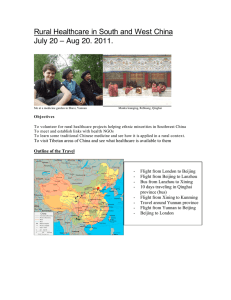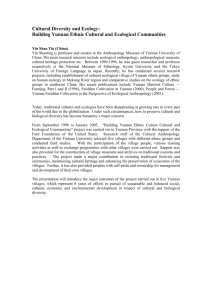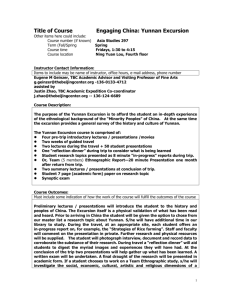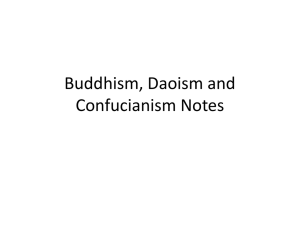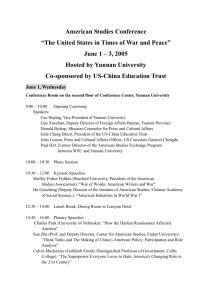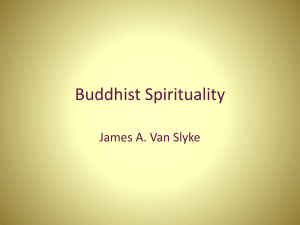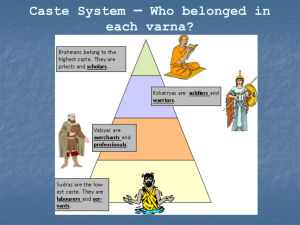云南宗教文化
advertisement
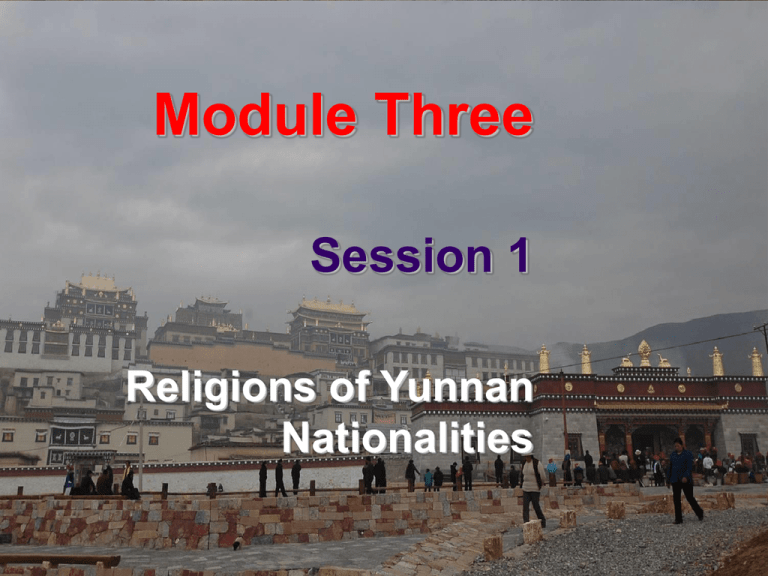
Module Three Session 1 Religions of Yunnan Nationalities What is Religion Religion is a set of beliefs and patterned behaviors concerned with supernatural beings and forces. (Gary Ferraro) Function of Religion Social function: 1. social control 2. conflict resolution 3. intensifying group solidarity Psychological function 1. a cognitive function, whereby religion provides an intellectual framework for explaining the unknown parts of the world 2. emotional function, whereby religion helps to reduce anxiety by prescribing some straightforward ways of coping with stress. Lead-in Questions Here are some pictures, look and think! Do you recognize these places? What religion does each of the site represent? Major Beliefs of Yunnan Nationalities Buddhism Daoism Catholicism Islam Primitive beliefs Basic facts of Buddhism in Yunnan Buddhism Sects and denominations in Yunnan 四大部派 1. Southern Buddhism (南传佛教) 2. the Acaryan Buddhism (阿吒力密教) /Tantrism 3. Han Buddhism(汉传佛教) 4. Tibetan Buddhism (藏传佛教) Southern Buddhism It is found in no other place in China except in Yunnan. Introduced into Xichuangbanna area in about 13-14th century from the neighboring countries such as Tailand,Myanmar,etc。 Followers are mainly:Dai, Bulang, Achang, De‘ang Nationalities The Acaryan Buddhism (阿吒力密 教) Introduced into Dali area of Yunnan from India in about 7th century Integrated with the local primitive religion and forming a feature of witchcraft,and localized. Followers are mainly: YI, Bai and Han. Han Buddhism 汉传佛教 Introduced into Dali (Erhai Lake) area from Sichuan and Guizhou in Nanzhao Kingdom period (653-902). Followers are mainly: Han, Bai, Yi, and Naxi Integrated with traditional Chinese culture, it formed many sects such as Tiantai, Huayan, Zan etc. Tibetan Buddhism 藏传佛教 Introduced to places neighboring Tibet from Tibetan in about 11th century Integrated with local ethnic primitive beliefs forming 4 major sects: Nyingma (red),Kagyu (the white),Sakya (the striped ), Gelu Sect (the yellow) followers: Tibetan and Naxi nationalities and Mosuo and Pumi ethnic groups A religion with Yunnan ethnic features Religious Cultural Site Case 1 Chongsheng Temple in Dali Major attractions of this temple The Three Pagodas The Jianji Bell The Halls and pavilions built along the northsouth axis : e.g. The Pavilion of the Achuoye Goddess of Mercy Cultural relics views For more details refer to “Tour-guiding the Colorful Yunnan” P137-142 Reading tasks 1. 吴宝璋, 霍永寿“Yunnan English Guide” p.1113. 旅游教育出版社,2006 2.吴宝璋,何昌邑, “Scenic Regions of Yunnan” p. 402-419. 云南大学出版社,1999 3.黄瑛 “Tour-guiding the Colorful Yunnan” P137142.云南大学出版社,2008 4. 杨学政<云南宗教史> P. 26-178.云南人民出版 社,1999. Questions 1. Name some Buddhist cultural relics in Yunnan? 2. What are the characteristics of Buddhism in Yunnan? 3. Why was Dali know as “the capital of Buddhism” in the past?

